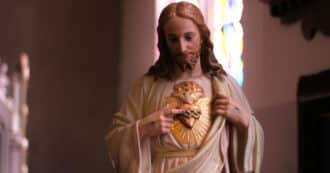The Rev. Dr. Leah D. Schade
As churches celebrate the Feast of St. Francis with a blessing of the animals, Jesus’s blessing of children urges us to prioritize the wellbeing of those most vulnerable.
Here are ideas for reading and preaching Genesis 2:18-24 and Mark 10:2-16 for Oct. 6, when congregations celebrate the Feast of St. Francis and Blessing the Animals Sunday. This is part of the EcoPreacher 1-2-3 series to equip preachers and congregations for engaging the Bible through an ecological lens. These texts are assigned as part of the Revised Common Lectionary for the twentieth Sunday after Pentecost, Year A.
Eco-Exegesis
Eco-exegesis is a method of interpreting the biblical text through a green lens using the principles of ecological theology.
Genesis 2:20a
The man gave names to all cattle, and to the birds of the air, and to every animal of the field.
Jewish sages note that Adam’s act of naming the animals initiated a “relationship of recognition and non-violent interaction” (Eco Bible, Vol. 1, Rabbi Yonatan Neril and Rabbi Leo Dee, Interfaith Center for Sustainable Development, 13). In Hebrew, the words used for insects, animals, and people are nefesh chaya, literally, “a soul of life.” From this we can see that God originally intended no hierarchy of worth between humans and the rest of the animals.
In fact, according to one midrash, “God paraded the various animals before Adam to name them after he studied their respective characteristics” (Eco Bible, 14). In other words, the relationship was one of respect and learning, not domination and exploitation.
Rabbi David Seidenberg writes that according to the stories in the midrashim, “the animals come to us as teachers, providing moral examples for us; they are not just presented as vassals or objects to be taken care of. We can learn from them only by humbly standing in relation to them, i.e., by ‘under-standing,’ in the truest and deepest sense of the word” (Eco Bible, 14, quoting Rabbi David Seidenberg, “Crossing the Threshold: God’s Image in the More-Than-Human-World,” PhD thesis, Jewish Theological Seminary, 2004, 164.)
Today, animals are primarily viewed in one of several categories: food and labor, pets, nuisance, or danger. We either commodify them, coddle them, tolerate them, or seek to eradicate them. Rarely do we view them with the same reverence that Adam had for the first of his Earth-kin. Perhaps even worse is when we don’t even consider them at all as we decimate their habitats and disrupt their migration patterns and adaptation capacities with climate change.
A sermon celebrating the Feast of St. Francis could call for a repentance of our ruptured relationship with animals as a sign of our reverence for the One who created them in the first place.
Mark 10:14
But when Jesus saw this, he was indignant and said to them, “Let the little children come to me; do not stop them; for it is to such as these that the kingdom of God belongs.”
When the disciples rebuked people for bringing their children to Jesus for a blessing, he turned the rebuke right back around on them. For some, children were viewed in similar categories as those of animals – either commodified or coddled, or seen as a nuisance, or even as a danger when they are children of one’s enemies. But Jesus saw them differently – as fully human beings who were worthy of his blessing.
Clearly, Mark intended this story to teach his church what it meant to receive the Beloved Community. They are to have an attitude that is like that of children who know instinctively that they depend on those who care about them. There is simultaneously an act of agency on the part of the children (they go to Jesus of their own accord) and an act of receptivity (they receive Jesus’s touch and embrace). We can’t miss the warmth and humanness of Jesus in this moment with the children. He obviously cares about kids and wants them to flourish with his blessing.
But as with animals, those who make decisions today often do not consider children at all. When we destroy natural places, pump toxins and greenhouse gases into the atmosphere, and fail to stop the extinction of species that enrich life on this planet, we are essentially rebuking children, whether we admit it or not.
Yet young people themselves are fighting back against the destruction of ecosystems, the climate, and their future. Organizations such as Greta Thunberg’s Fridays for Future, the Sunrise Movement, and religious-based youth climate groups are leading the way on environmental and climate justice.
So, on the Sunday celebrating the Feast of St. Francis and Blessing the Animals, churches can celebrate and support their own young people or youth in their community by offering scholarships, prizes for activism, and prayers for their flourishing. Because blessing the animals and blessing the children are both holy acts of faith inspired by the divine embrace of love, healing, respect, and generosity.
The Eco-Idea is one succinct statement that tells us who God is and/or what God does in relation to Creation and how we should respond as people of faith.
As churches celebrate the Feast of St. Francis with a blessing of the animals, Jesus’s blessing of children urges us to prioritize the wellbeing of those most vulnerable.
Eco-Questions are what we can ask to help a congregation draw out the implications of the Eco-Exegesis and Eco-Idea.
- As we bless our own pets, what are the species in our area that are threatened with extinction? How can we help ensure that all animals have sufficient habitat, food, migration corridors, and breeding grounds to sustain them for generations to come?
- What organizations in your community are supporting children who are working to protect local ecosystems and draw attention to the effects of the climate crisis? How can your congregation join with these groups, amplify the message of the children, and celebrate the blessings they are teaching us to receive?
Eco-Actions are ways that a congregation might respond to the Eco-Idea and Eco-Questions. One of these possibilities may work well in your ministry context.
- In the week leading up to the Sunday celebrating the Feast of St. Francis, invite the congregation to take pictures of all the animals and insects they see in the vicinity around the church building. Put together a digital or print collage of the animals with both their scientific and common names and bless them during the service.
- Since blessing the animals is not just for our pets but for wild animals as well, schedule a forum to learn about how your congregation can support nature preserves in your area.
- Organize a committee to offer scholarships and prizes to young people in your church and community who are active in climate and environmental advocacy. Invite them to a worship service to pray for them, celebrate their work, and bless their endeavors.
* Featured image source





